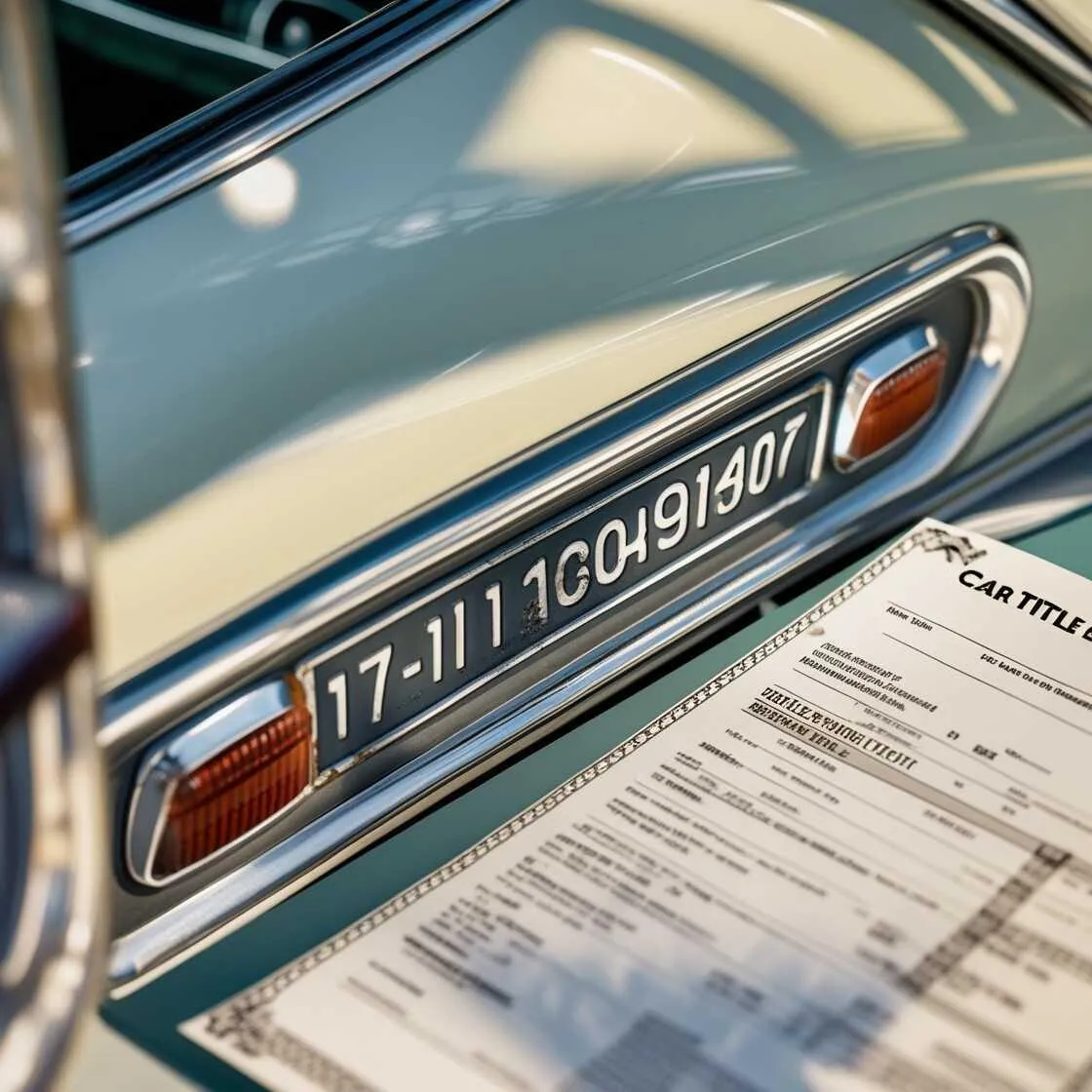
What If the VIN on the Car Doesn't Match the Title?
Buying a used vehicle like a classic car, RV, or special one such as a military Humvee can be fun, but it might bring surprises. About 20% of used car buyers run into title problems, often because they skip checking the VIN. A VIN mismatch is a common issue where the number on the title doesn't match the one on the car.
This guide explains what it means, why it happens, the risks, and how to fix it. It helps with registering everything from motorcycles to imported Kei trucks. If titles worry you, our avoid car title troubles guide reveals mistakes you can't afford to make.
Understanding a VIN Mismatch
A VIN mismatch happens when the 17-digit Vehicle Identification Number on your car's title doesn't match the one on the vehicle. The VIN is like a fingerprint; it tracks history, ownership, and details in DMV, insurance, and police records. People often ask: Is the title number the same as the VIN? No, the title number is just for the document; the VIN IDs the car itself.
Find the VIN in spots like:
Driver's side door jamb (sticker or plate).
Dashboard (seen through windshield).
Under hood (firewall or engine area).
Sometimes engine block, frame, or windows.
A mismatch can confuse things, delay registration, or raise flags especially for uniques like military Humvees or old bikes with odd formats. For classics without standard VINs, our no VIN classic car guide unlocks fixes you need. Always check all spots to catch issues fast.
Causes of VIN Mismatches

VIN mismatches come from different reasons, each affecting owners differently especially when buying. Knowing why helps see if it's small or big. Common causes:
Repairs or Rebuilds: Fixed-up cars after crashes, like salvaged classics or off-road UTVs, might use parts from other vehicles. A 1970s Jeep could have a hood with a different VIN.
Clerical Errors: Typos or mixed digits on titles, common for old cars or cross-state transfers. An imported Kei truck's VIN might get messed up from unfamiliar codes.
Engine Swaps: New engine means mismatched VIN on the block. Usually okay for titling (not always checked), but tricky in strict states.
Fraud or Theft: Changed VINs might hide salvage history or match stolen cars to clean titles. Rare but serious needs quick action.
Non-Standard VINs: Specials like military Humvees or Kei trucks have weird formats not matching 17-digit standards.
Fixes depend on the cause a typo needs title correction, fraud needs investigation. Special vehicles add challenges with unique builds or imports, so keep good records. For mileage mix-ups linked to VINs, our fix car title mileage guide has solutions you won't want to skip.
Is a VIN Mismatch a Problem?
Yes, a VIN mismatch can cause issues, but how bad depends on your state and situation. It might block registration, fail inspections, or raise fraud flags.
Registration Delays: DMVs need matching VINs for plates that could leave your car parked.
Inspection Failures: States like California or New York check VINs for out-of-state titles.
Fraud Concerns: Mismatch might look like theft.
Not all are huge if one VIN spot matches the title, some states okay it with docs. For example, a bike with mismatched engine but right frame VIN might pass in Kansas (no in-state checks). Act fast and know your DMV rules to avoid trouble. For transfers, our car title transfer process in the Texas guide shows regional steps you need.
Can You Change a VIN Number?
No, changing a VIN is against federal and state laws it's seen as fraud, like theft or cloning. It can bring fines, car seizure, or charges.
If damaged or missing (like rusted on old car), don't make a new one. Instead:
Correct title to show true VIN with docs like bill of sale.
Get a DMV or pro replacement plate matching the original.
A 1950s Chevy owner with a faded plate might need DMV okay after ID check. Legal ways keep you safe. For errors when selling, our fix car title errors when selling guide has tips to protect your deal.
Risks of a VIN Mismatch
A VIN mismatch can cause big headaches, especially for valuable or special vehicles like RVs, classics, or UTVs. Risks include:
Registration Delays: No matching VIN means no plates your car sits undrivable.
Can't Sell or Insure: Buyers/insurers check VINs; mismatch looks shady, could kill deals.
Legal Issues: Might flag as stolen, drawing police attention tough for uniques like Humvees.
Extra Costs: Fixes mean fees for checks, corrections, or pros.
An off-road fan making a UTV street-legal could face delays from mismatch, ruining plans. A Humvee owner might get extra scrutiny from an odd VIN. Fix quickly to protect your money. For modded cars, our registered highly modified cars out-of-state guide changes everything.
Steps to Resolve a VIN Mismatch
Fixing a VIN mismatch is doable with steps based on cause and state rules. Here's how for bikes, classics, or specials:
Run a VIN Check: Use Carfax or AutoCheck for history spots titles, accidents, theft. Might show rebuild explaining mismatch.
Gather Docs: Prove ownership and fix:
Current title (even wrong).
Bill of sale.
ID (license).
Repair proofs for rebuilding.
Import papers for Kei trucks.
Visit DMV: Send docs for title fix. Usually:
Inspection to check plate (dashboard, door).
Fees $10-$50.
Forms like Texas VIN verification.
Processes differ: Missouri might need a central office, Montana is easier for LLCs. Expect weeks/months in some.
Fix Damaged/Missing Plates: If plate is bad, get DMV/pro replacement after inspection, docs review, approval.
Use Title Services: For complex/slow, pros handle mismatches great for Humvees/Kei trucks with prep, checks, corrections.
Know State Rules: California strict on out-of-state, Kansas waives some. Check the DMV site.
Verify Repairs/Mods: Show invoices/donor records for mismatches. Key for off-road/imports with aftermarket.
A 1965 Corvette collector fixed typo mismatch with check, sale bill, DMV visit in two weeks. The Kei truck owner used import docs to fix errors, no long delays. For classics without titles, our registered classic car without title USA guide is a must.
Preventing VIN Mismatches When Buying
Stop problems before they start. Always check VIN in multiple spots against the title. Run history report pre-buy. For imports/specials, verify docs match. Ask the seller for repairs/swaps. A quick check saves time/money, don't skip it.
Benefits of Montana LLC Registration
For VIN mismatches or tough titling, Montana LLC registration helps high-value/special vehicles. Perks:
Flat-fee registration: Saves $5,000-$15,000 on valuables like RVs/classics/Humvees.
No Inspections/Emissions: Great for non-standard VINs/mods.
Permanent Plates: No yearly renewals, eases ownership.
A Humvee owner fixed military VIN mismatch via LLC skipped checks, saved $7,500 tax. Kei truck owner bypassed emissions, fixed typo fast. Set up LLC to own a car, register in Montana okay for any state if done right. Docs key for mismatches; provide proofs like imports/repairs. For more, our Montana classic car registration guide unlocks savings you need.
Careful with details incomplete papers delay. Pros navigate for niches with odd VINs/mods.
FAQs About VIN Mismatches
What is a VIN mismatch?
The title VIN differs from the vehicle's plate (door jamb/dashboard). From repairs/errors/fraud delays registration, raises flags.
Is there a difference between VIN and title number?
Yes VIN 17-digit car ID for history. Title number DMV code for document. Match VIN for legal plates.
Is a VIN number proof of ownership?
No IDs, car, no owner. Need title/sale bill/registration for proof. Matching VIN ties title to vehicle.
Can a VIN number be changed?
No illegal tampering. For damaged/missing, get legal DMV/pro replacement matching original.
Final Thoughts
A VIN mismatch can slow registering bikes, RVs, or specials like Kei trucks/Humvees. From errors to fraud, risks are real delays, legal costs. Run checks, gather docs, follow state steps to fix. Montana LLC simplifies perfectly for niches. For help, contact title pros. Basics clear? Our difference titling tagging registering guide explains what you missed.



